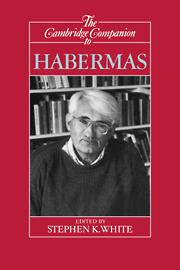Book contents
- Frontmatter
- PART I INTRODUCTION
- PART II HERITAGE AND CONTEXT
- 2 Identity and difference in the ethical positions of Adorno and Habermas
- 3 What's left of Marx?
- 4 Universalism and the situated critic
- PART III COMMUNICATIVE RATIONALITY
- PART IV DISCURSIVE DEMOCRACY
- PART V THE DEFENSE OF MODERNITY
- Select bibliography
- Index
4 - Universalism and the situated critic
from PART II - HERITAGE AND CONTEXT
Published online by Cambridge University Press: 28 May 2006
- Frontmatter
- PART I INTRODUCTION
- PART II HERITAGE AND CONTEXT
- 2 Identity and difference in the ethical positions of Adorno and Habermas
- 3 What's left of Marx?
- 4 Universalism and the situated critic
- PART III COMMUNICATIVE RATIONALITY
- PART IV DISCURSIVE DEMOCRACY
- PART V THE DEFENSE OF MODERNITY
- Select bibliography
- Index
Summary
It has long been a curious feature of Jürgen Habermas's reception in the English-speaking world that, for all the intense and exhaustive scrutiny of his critical social theory, Habermas's role as a politically engaged intellectual, polemicist, and essayist in the political public sphere has received relatively little attention. Given the consistency with which Habermas himself has worked toward a normative theory of political participation - and also given the fact that, over the last decade or so, Habermas has rather unobtrusively emerged as Germany's most prominent intellectual as well as its most influential social theorist - this lack of interest in Habermas's “moonlighting role as an intellectual” seems difficult to explain.
In what follows, I would like to sketch in very broad strokes the major focus of Habermas’s activity as a politically active intellectual over the past few years, in order to suggest that, to an unrivaled degree, Habermas has single-mindedly worked to bring his theoretical and his political writings into a steadily closer relation with each other. The universalism that lies at the heart of Habermasian theory remains an empty abstraction unless it can be reconstructed within the context of a concrete lifeworld; it thus cannot be disassociated from the particular fate of universal mentalities - what Habermas calls “constitutional patriotism” - in the Federal Republic. Conversely, Habermas’s political writings on the Federal Republic are unified by the single-minded project of protecting and cultivating a form of republican commitment that only makes sense insofar as there is a corollary theoretical justification of moral-political universalism.
- Type
- Chapter
- Information
- The Cambridge Companion to Habermas , pp. 67 - 94Publisher: Cambridge University PressPrint publication year: 1995
- 11
- Cited by

